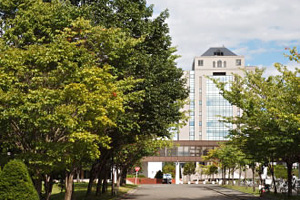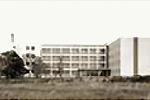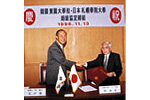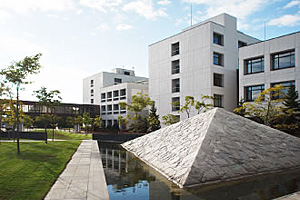History
In 1946, Sapporo Bunka Senmon Gakuin, the predecessor of Sapporo Gakuin University, was established in Sapporo. After World War II, there was a movement among young people who were looking for direction in their lives for the establish a liberal arts university in Hokkaido. Those enthusiastic young people and the faculty members who supported them established what was to become Sapporo Gakuin University.This spirit of cooperation has been handed down generations until now.

University History
Sapporo Bunka Senmon Gakuin
1946

- Sapporo Bunka Senmon Gakuin (three-year program for economics, law and humanities majors) established.
- Opened in the former Agricultural Hall in Nakajima Park, Sapporo.
Sapporo Junior College
1950
- Status raised to level of university and renamed Sapporo Junior College.
- Department of Commerce and Department of English Language and Literature established.
1951
- Evening Division of the Department of Commerce established.
Sapporo College of Commerce
1968
- Campus moved to suburban Sapporo, in Bunkyodai, Ebetsu.
1976
- Department of Economics added.
1977
- Department of Human Sciences added.
1983

- First Culture Exchange Program started with University of California-Davis, USA.
Sapporo Gakuin University
1983
- Culture Exchange Program started with University of California, Davis, USA.
1984
- Name of University changed to Sapporo Gakuin University.
- Department of Law established.
1991
- Department of Social Information added.
1994
- International Exchange Center opened.
1995
- Graduate School of Law (Master's Program in Law) established.
1996

- Half-year Intensive English Program started with Pacific Lutheran University,USA.
- Fiftieth anniversary celebrated.
1998
- One-year student Exchange Program started with Dongguk University, Korea.
- Half-year Intensive English Program started with Essex University, UK.
- Culture Exchange Program started with Simon Fraser University, Canada.
2000
- Graduate School of Clinical Psychology (Master's Program in Clinical Psychology) established.
- Culture Exchange Program started with Renmin University, China.
2001
- Undergraduate Department of Clinical Psychology added.
2002
- Half-year Intensive English Program started with Monash University, Australia.
2003
- Graduate School of Regional Management (Master's Program in Regional Management) established.
2005
- Culture Exchange Program started with Dong-A University, Busan, Korea.
2006
- Department of Child Development added.
- One-year student Exchange Program started with Dong-A University, Busan, Korea.
2007
- Half-year Intensive English Program started with University of Exeter, UK.
2008
- Culture Exchange Program started with Jimei University, China.
2009
- Department of Accounting and Finance and Department of Business Administration established.
- One-year student exchange program and cultural exchange program started with Konkuk University, Korea
- Cultural exchange program started with Chiang Mai University, Thailand.
2010
- One-year student exchange program started with Soongsil University, Korea.
2011
- Mutual exchange agreement concluded with Nanjing University and Beijing Agricultural University, China.
- One-year student exchange program started with Hannam University, Korea.

The Philosophy of the University
Autonomy
A university which promotes autonomous nature of the individual student.
Human rights
A university which respects human rights.
Coexistence
A university which exists in harmony with the community
Cooperation
A university constructed on the efforts of all its members
Educational Goals
1. To develop student autonomy
The development of autonomous thinking to allow people to study with self-motivation and to enable them to voluntarily explore the potential in their lives.
2. To develop a rich sense of humanity
The development, through a well-rounded education, of individuals who are responsible and who can become active participants in civic life.
3. To develop responsible citizens
The development of individuals who can voluntarily address social challenges and contribute to society with judgements based on open minds and flexibility.
4. To develop specialists
To provide the skills and advanced knowledge to a graduate level that will enable individuals to play a leading role in society in their specialized fields.

